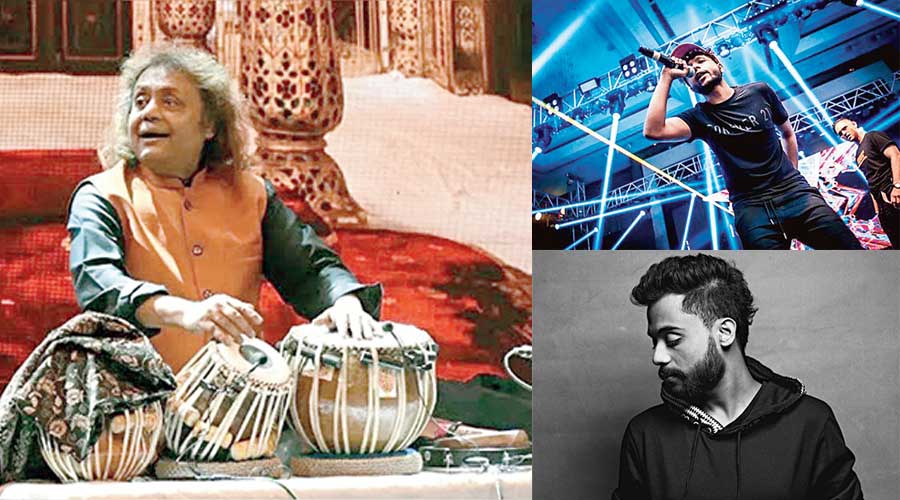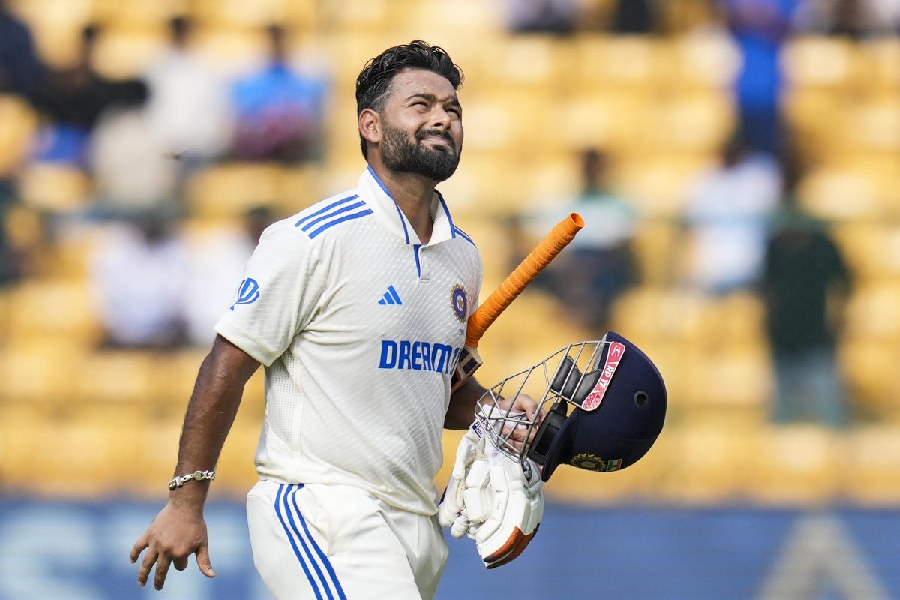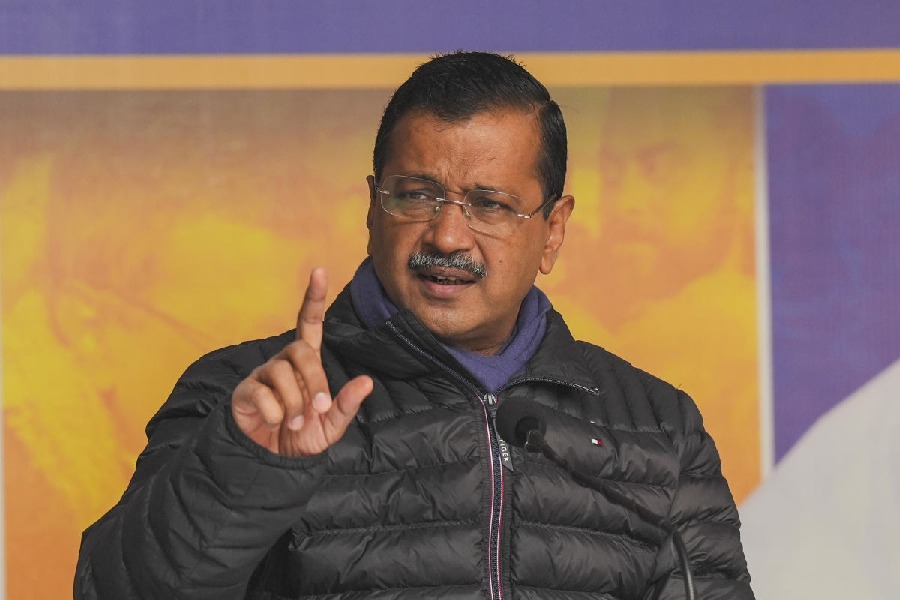Father: Tanmoy Bose
Sons: Shiladitya and Aryaditya
When was the first time you saw your dad perform?
Shiladitya: As a child, I was a crybaby, my mom would often avoid taking me to his shows but as I grew older, she took me to one of his concerts at Sangeet Research Academy (ITC-SRA) where I first heard him. I was used to watching him practise at home but that was the first time I saw him live and I remember returning home speechless. The way he took control of the audience with his music made me decide that I wanted to be like him.
How does it feel when you work with him?
Shiladitya: My father is a completely different person at home and he is another person on stage. At home, he spends time joking with us but on stage he’s Tanmoy Bose. I have worked with him regularly as a drummer and sound designer on his project Taaltantra, and each time I work with him I learn something new. Even though our forms of music are poles apart, our language, however, has a common ground. It’s super fun working with him but, at the same time, he’s strict when I mess up. He wants the best for me.
Tanmoy: I remember the fun we had performing together on stage a couple of times. I enjoy surprising them with unknown passages, which we haven’t rehearsed. It is great fun to see how they address the situation.
Will we ever see a collaboration involving the three of you?
Tanmoy Bose: Shiladitya has travelled with me to many parts of the globe, performing for my world music projects. But Rythmania was the first project we did together where I offered him to take the driver’s seat with electronica and I followed him. I have plans to engage Aryaditya rapping with me against ‘konakkol’.
Was there ever an interest to pursue classical music like you father?
Shiladitya: I have always been intrigued with Indian classical music. Although I have learnt it to a certain level, I found my calling elsewhere. This is one of the things I respect about my father — he never told me that I have to follow his kind of music. He has always been very supportive about the music I play and the things I do.
Aryaditya: Until I was 15, I planned on playing the tabla and I still plan to restart my riyaz in the near future.
Is there something all of you have learned from one another?
Shiladitya: First, practice, practice, and practice more. No matter what, I give at least one hour a day to my music — I could be DJing, producing tracks or playing the drums. From my brother I have learnt that I should always pretend to be broke! Jokes apart, I am seeing him transform into this wonderful human being and expressing himself through his kind of music. I’m proud of what he is doing.
Aryaditya: I have learnt dedication, musicianship, and pretty much everything there is to know about being a performer from my father. My brother has taught me to learn to persevere and evolve as a musician.
Father: Pandit Subhen Chatterjee
Son: Sambit Chatterjee
What do the two of you enjoy about each other?
Sambit: I enjoy the simplicity and ease he has over his instrument. I love that fact that he thinks about music in general rather than being selfish about his instrument... that’s rare.
Pandit Subhen Chatterjee: Other than connecting with each other rhythmically, we enjoy our impromptu jamming without knowing where it would finally lead us.
How do you inspire each other?
Sambit: When I’m in Calcutta, I wake up early morning to find him practising while staring at the trees outside our veranda. That inspires me. He loves his music and is disciplined.
Can you describe your practice sessions?
Sambit: There’s no dedicated time for it, we’re talking about music and rhythms 24x7... about how to make each other’s playing interesting. If I listen to something new, I want him to adapt to that, if he comes across a wonderful composition of our guruji, Pandit Swapan Chaudhuri, he wants me to adapt that to my playing. This happens through the day.
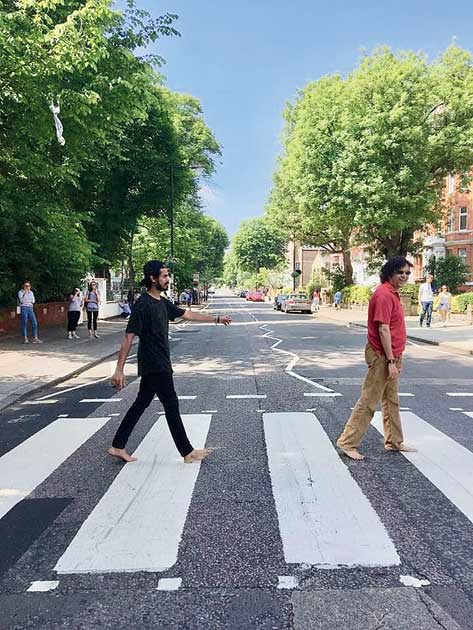
Any memorable concert where you played together?
Sambit: Baba and I were called by the high commission of Sri Lanka to perform in 2018 and we got VVIP treatment and we played to a huge audience... that was truly special. To be able to represent our country is always a matter of pride.
Any upcoming release from the two of you?
Sambit: Yes, this month we are coming out with our new original song from Bandish Fusion — Karma (fusion band), and this time we have some incredible international artistes featuring in the song.
Any advice from your father that you follow?
Pt Subhen Chatterjee: Work hard, chase your dreams.
Sambit: My father keeps saying that nature is the greatest teacher and humans are here only to learn. He also says, “We don’t have enough time on earth; so don’t waste it sleeping... that’s for old age.”
Father: Sandeep Vyas
Kids: Samara and Nirvhan
When did you realise your children had a knack for music?
Sandeep: From a young age both Samara and Nirvhan have been exposed to various genres of music. They have been singing and winning talent contests.
Do you jam at home?
Sandeep: We love rock music. We start jamming on the piano or the guitar and, at times, sing aloud while headbanging!
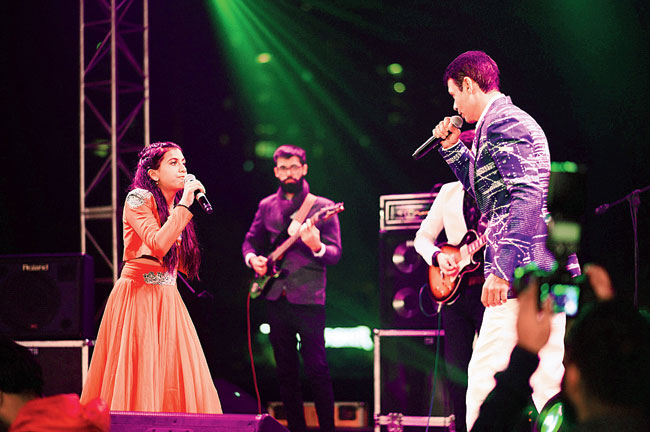
How has your dad been an inspiration to you?
Samara: One of the the main reasons I want to be a singer is because I want to follow in my father’s footsteps. Watching him perform on stage, having a great time and being a rock star really inspires me. He inspired me to start writing songs. I don’t think I’d ever be the person I am today if it wasn’t for him.
Are the three of you planning to work on anything together?
Sandeep: We hope we can do some songs together someday.
What do you think of your dad’s talent?
Nirvhan: My dad is a rock star.
Samara: I think my dad’s talent is unmatched. I’ve never met anyone as kind, hard working and amazing as him. Listening to all his stories about crazy tiring times he has had while working on his shows has made me realise how difficult it is to be a serious artiste. He does it all with ease and with a smile on his face. I just don’t know how he does it.
What’s common between all of you?
Sandeep: We all love ’70s, ’80s and ’90s music, bands like Led Zeppelin, Queen and Aerosmith.
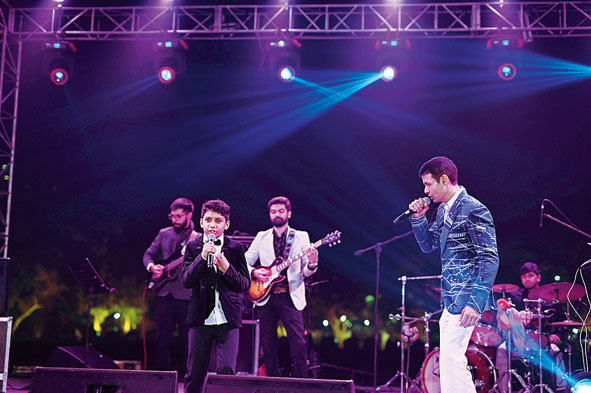
Father: Pandit Debashish Bhattacharya
Daughter: Anandi Bhattacharya
Did Pandit Debashish Bhattacharya inspire you to become a singer?
Anandi Bhattacharya: I don’t think I really understood the word when I began training with him. It was inevitable that I would do something related to music, given that I listened to most of my family members practise, teach or play music in every room of the house. As far as my memory serves, each time Baba played, I was hypnotised.
When did you realise that Anandi had a knack for music?
Pandit Debashish Bhattacharya: I think she was about 11 months old... when I was walking on the terrace with her in my lap. I sang the first four notes — sa re ga ma — and she promptly replied, singing pa dha ni sa... perfectly in tune.
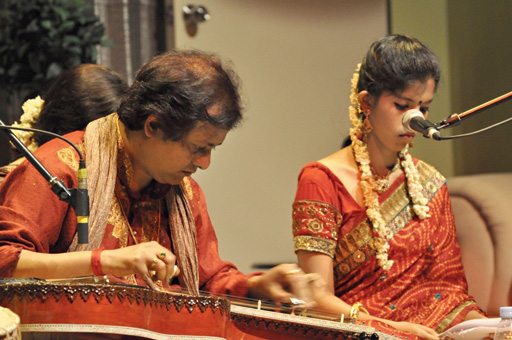
How receptive is your father to your style of music?
Anandi: He was the one who opened up for me the portal to explore different genres. He always encouraged me and believed that I could sing anything. He protected and defended me from anyone who tried to tell me otherwise. So yes, he is more than receptive. I would say he has, for more times than I can count, provided the impetus for me to take a leap of faith with any and every genre I want to explore, and thanks to him, I sing in more than seven languages. I’m also writing music that borrows from various genres.
What was his first impression when he heard you perform?
Anandi: I remember it like it was yesterday. It was my international debut in Singapore and I sang several Tagore songs. He is always the most encouraging musician to be on stage with and he is always having fun and it’s all very uplifting. I think he was proud. He never really praised me explicitly. He would always immediately point out all the things I could do better — as a performer — and our next lesson would be all about that and more.
Do you see a reflection of yourself in your daughter?
Pt Debashish Bhattacharya: Quite often, and I suppose for any parent that feeling cannot be put into words. You want to protect them fiercely. I see her vulnerability and I see how it empowers her, in the same way that it empowered me... to connect and to never be daunted of being open. That is truly the way to make art.

